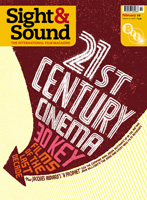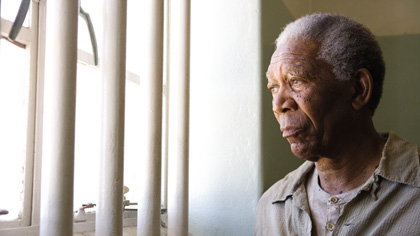Primary navigation

USA 2009

Reviewed by Michael Atkinson
Our synopses give away the plot in full, including surprise twists.
In 1994, having been released from his long imprisonment, Nelson Mandela is elected as the first president of post-apartheid South Africa. He immediately begins to set up his staff and security team with one predominant notion: that blacks’ revenge against the Afrikaners cannot be indulged, and the culture must embrace integration if stability and peace are to take hold. Racial tension runs high, even in the president’s offices. Among many other state matters, Mandela focuses on the nation’s rugby team, the Springboks, beloved by the whites and loathed by the black majority (who have traditionally preferred soccer). To the astonishment of his black followers, Mandela makes public appearances supporting the team’s international efforts and consults with the captain, Francois Pienaar, who has little stake in racial politics and simply plays rugby for a living. The nation begins to pull together gradually over the Springboks and the new ‘one team, one nation’ slogan. Mandela, who is 75, has health issues, but the fate of the Springboks’ season is paramount. He encourages Pienaar to inspire his teammates, and soon his prodding starts to work. The Springboks begin to win games, and eventually beat the formidable New Zealand team in a match that succeeds in uniting the country.
For many critics, Clint Eastwood has entered an autumnal golden age in which virtually every fault or glory in his films is perceived only as an aspect of what is quintessentially Eastwoodian, despite the fact that most of his late movies, from Midnight in the Garden of Good and Evil to Space Cowboys to Million Dollar Baby, Changeling and Gran Torino, are half-baked or half-hearted shots at meaningfulness, riddled with cheap shots, cliché and oversimplification (though you may see this as Eastwood’s Fordian classicism, or something). I’ll pit the wisdom, depth and unease of Unforgiven against a hundred Asian art films, but Eastwood gets a pass nowadays for what would earn a younger film-maker a chorus of critical moans. Invictus is Eastwood in full Stanley Kramer/Richard Attenborough mode, playing down to the Americans who love cheesy triumphant-sports movies but who generally know little about South Africa and care even less.
Here, the first year or so of Nelson’s Mandela’s historic presidency is taken up almost entirely with rugby – watching it, and worrying about it, as the South African team makes a run for the 1995 Rugby World Cup – and for those of us who doubt that restoring a troubled nation is as easy as bonding over a sweaty ball game, the steady and unvarying schematic structure of the film can be tiring and childish. Every scene, in Eastwood’s late fashion, exists merely to make a point; indeed, most scenes are briefly constructed to arrive only at some righteous declaration or another. It’s an airless film, without much in it that doesn’t hit you in the face with race-relations sanctimony like so many pies. (In an extended interlude, Eastwood takes the mostly white rugby team on a guided tour of Robben Island and Mandela’s old cell there.) When we aren’t being sermonised, or cheek-warmed by a black character and a white character begrudgingly sharing a minor moment, we’re overdosed on septuagenarian cuteness. It’s not Morgan Freeman’s fault per se – he does a respectable Mandela, and exudes his usual and invigorating moral force – but Eastwood’s, and screenwriter Anthony Peckham’s, both of whom lunge for every chance to locate moments of twinkly-eyed impishness in Mandela. Is this how we should remember this iconic figure, as an aphorism-spouting teddy bear? Freeman’s characterisation seems closer to his Hoke in Driving Miss Daisy than to the full range of statesmanlike roles the actor’s had since, but we’ve felt this soft-stroke before in Eastwood’s oeuvre, where everyone over 55 is a loveable curmudgeon.
Like Gran Torino, Invictus is a well-meaning but crashingly unsubtle film. I think what people like about the Eastwood films of the past 15 years is his sense of effortless gravity – you feel as if you’re in weathered hands, and you know the heart is exactly where it should be. But that never means you can expect wisdom, or emotional points that don’t feel canned or redundant. You could read the film’s white characters, including Matt Damon’s placid rugby captain Francois Pienaar, either way – the movie’s complete lack of expressive bigotry on the Afrikaners’ part might reflect their discomfited relationship with their newly biracial society, one in which they can no longer speak their minds, or it might reflect Eastwood’s inability to score his feelgood points in a context that’s actually fraught with real animus and prejudice. Given Freeman’s crusty cuddliness, I suspect it’s the latter.
Damon, to his credit, imbues his absolutely featureless character with a degree of integrity, but his real role is as the box-office anchor that might get white Americans (and Europeans) into the theatre, continuing the long and woeful legacy of race-issue films starring white people. Honestly, without Damon, how much chance does a film about just Nelson Mandela have?
The Man Who Drove with Mandela reviewed by Kieron Corless (August 1999)
African Cinema: Invisible Classics by Mark Cousins (February 2007)
Gran Torino reviewed by Kate Stables (March 2009)
Flags of Our Fathers reviewed by Ali Jafaar (January 2007)
Space Cowboys reviewed by Edward Buscombe (October 2000)
True Crime reviewed by John Wrathall (June 1999)